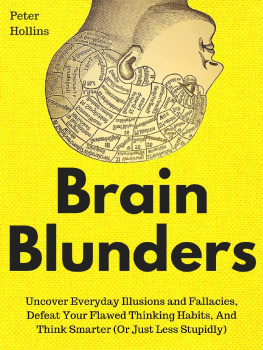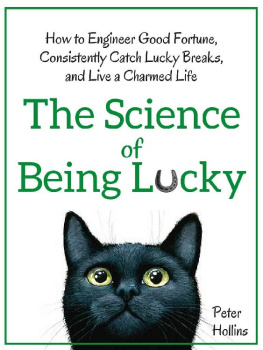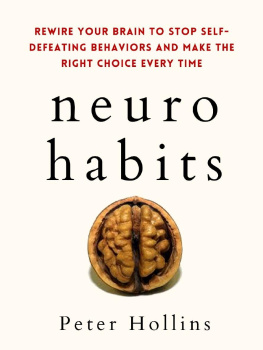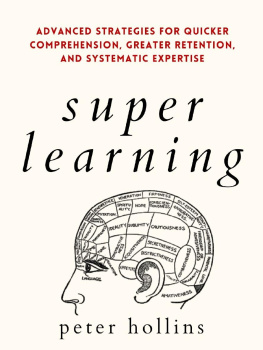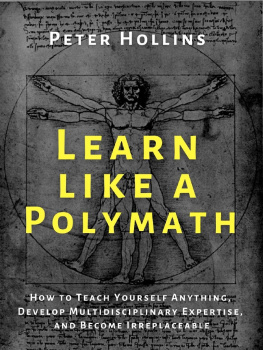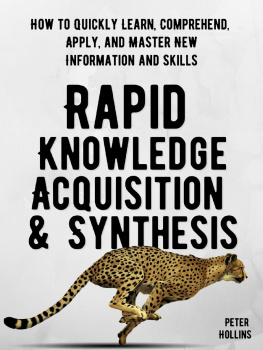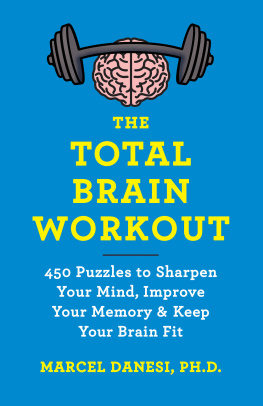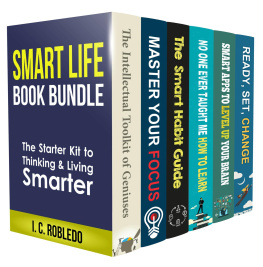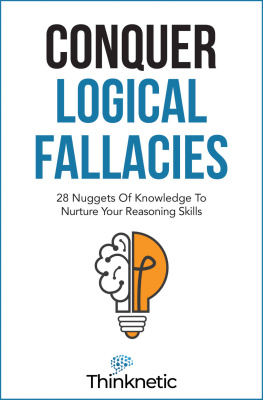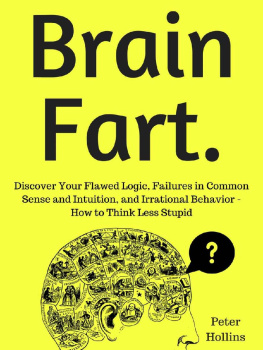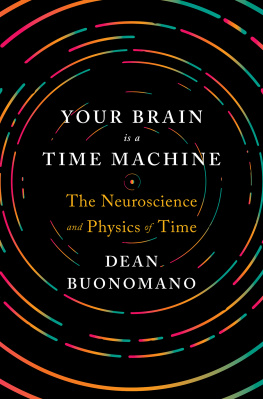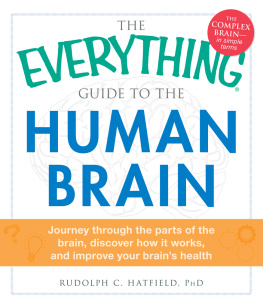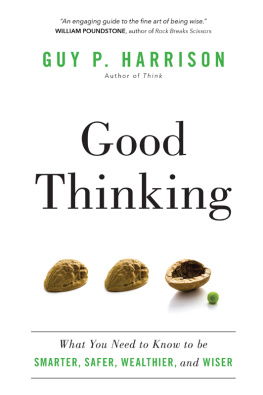Table of Contents
Brain Blunders:
Discover Your Flawed Logic, Failures in Common Sense and Intuition, and Irrational Behavior
How to Think Less Stupid
By Peter Hollins,
Author and Researcher at petehollins.com
Click for Your FREE Human Nature Cheat Sheet: 7 Surprising Psychology Studies That Will Change the Way You Think
Table of Contents
Table of Contents
The Asch Conformity Experiment
Milgrams Shock Experiment
The Stanford Prison Experiment
Clever Hans and the Ideomotor Effect
Why Do We Wear Stinky Socks to Support Our Favorite Sports Team?
Why Do We Believe in Magic?
Why Do We See Faces in Toast?
Why Do We See Things That Dont Exist?
Dj Vu: This Feels Familiar
False Memories: I Swear It Wasnt Me.
Flashbulb Memories: Do You Remember Where You Were During 9/11?
Six Weapons of Mass Influence
The Monopoly Effect
The Legacy of Halitosis
Be Like Mike
First Impressions Gone Wrong
Youre Wrong, Im Right
Breaking the Laws of Logic
Chapter 1. Misadventures of the Human Brain
When I was a teenager, I remember going with my parents to buy a new car.
The car certainly wasnt for me, no matter how much I begged and pleaded with the might of my newly minted drivers license. The car was for my mother; she had gotten into a minor accident, which our insurance company had deemed major enough to cover the cost of a new car. Many years later, it is still one of the few positive interactions I would ever have with insurance companies.
I distinctly remember this day because I remember the salesperson that we dealt withor rather tolerated. If you could create an untrustworthy salesperson in a lab, you would come up with this man. If you looked up the word sleazy in the dictionary, his picture would be next to it. He was the stereotype of a slimy salesman who would pat your back and keep repeating your name in an annoying fashion. His palms were sweaty and he shook your hand for far too long. It was like he had read all the advice of what not to do in sales and taken it as a challenge.
Things moved quickly because my parents were in a buying mood and it showed plainly on their faces. They were busy people and just wanted to get in, get the car, and get out. This type of sentiment is like blood in the water for salespeople, who want motivated customers that actually spend money.
We took a quick test drive and into the office we went to talk about exactly what model was desired and what the end price would be. I noted that the salesman didnt bring up the price until as late in the process as possible. Every time my father tried to clarify, he would say something like, Of course, well get to that right after this. I promise. Just a couple more things to hammer out.
He was doing this to draw my parents deeper into the process so as to gain their emotional investment in the car. When he finally presented the price with all the amenities my parents wanted (power windows, air-conditioning, a CD player, heated seats), he presented a figure that made my parents gasp. In particular, my father looked shell-shocked, like he had just witnessed a puppy being kicked.
The salesman had done his best to anchor the price exceedingly high, so even if my parents wanted to negotiate, they would have to start there and end up far higher than they wanted to. In other words, because the quoted price was high, it was innately assumed that you couldnt work too far down from it.
This might have worked on other people, but not my parents, who still kept things that were years past their expiration date just in case. Stingy would be an understatement. Not only that, but my parents were raised in a culture where you were mocked if you paid the sticker price on anything and didnt try to get a good deal. They had grown up going to local markets, and haggling was second nature to them.
My parents set their own price, which was as aggressively low as the salesmans was aggressively high, and it was the salesmans turn to gasp. He began to squawk about all the costs involved, but my father didnt take the bait; he simply reached into a folder he had brought with him and showed printouts of prices from other dealerships that were more in line with his own. He stood up, saying, I guess they will get my business. Its too bad. We liked you.
In what appeared to be the salesmans final argument to seal the deal at a higher price, he tried to get me on his side by appealing to my sense of desperation of wanting to drive. He said things like, Kid, if your father doesnt pull the trigger here, hell never get the prices at the other places and you wont be able to hang out with your friends! Little did he know I had a strict curfew and could never hang out with my friends regardless. He had tried to make an ally out of me, but I already disliked him, so I would never have agreed with him.
At this point, my parents started walking out and discussing the address for the next dealership, as well as how much they wanted a car that very day. The salesman started pursuing, and in the end, my parents walked out with the car they wanted at the price they wanted. (That car ended up being passed down to me some years later, and I found it profoundly funny that my parents had left the price sticker on the interior top of the front windshield as a reminder of their triumph that day.)
This battle of wills was forever emblazoned in my brain as an example of how people can be seduced into behaviors and thoughts that are completely contrary to what they want. The salesman was trying to raise the price while my parents were trying to lower the price; each side wanted to use a sneaky fallacy in thinking to achieve a specific outcome by clouding judgment. They were each trying to bend reality without tipping the other off.
But really, humans dont need help with clouding our judgment, thinking, reasoning, and perception. We make poor decisions and exhibit seriously flawed thinking on a daily basis. Our brains try so hard to make sense of the world that it actually works against them. Combine that with emotional thinking and a tendency to jump to conclusions and what do you get?
Well, us: overdeveloped primates with profoundly flawed brains that make suboptimal decisions. Humans really dont see the world as it is, and this isnt just due to a difference in opinions or experiences. We have to realize that our brains have a very different purpose than clear and accurate thinking; it wants pure pleasure, survival, and energy maintenancenot terms that often overlap with good judgment.
That would be like depending on your taste buds to make healthy decisions about diet. Thats not their purpose! Your taste buds just want to enjoy themselves and taste what they were designed to taste, regardless of the fat content or number of calories. We cant very well judge nutrition through how good something tastes because of fat, oil, and grease.
Its hard to overlook millennia of programming to see the world only in terms of, well, figurative fat, oil, and grease. This can result in funny one-time occurrences or massive errors with damaging consequences. We think we are driven by logic and reason, but it appears that common sense isnt really as common as wed like to think.
This book is a manual to the general misjudgment of your brain and why we do what we do in such peculiar and incorrect ways. Wouldnt it be nice to see the world as it really is and, most importantly, use that accurate information to make your decisions with?
The brain shows its bias as a selfish little monster in small, almost imperceptible ways.
For instance, if youve ever been in the middle of a sentence and your mind suddenly went blank, or if youve walked into a room and suddenly forgotten what you were doing there, youve experienced what is generally known as a

